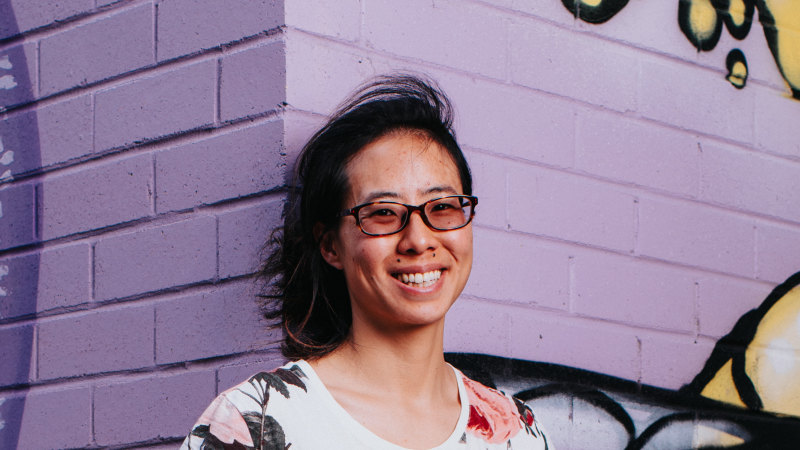Save articles for later
Add articles to your saved list and come back to them any time.
Shona Yu was six years younger that her peers when she graduated from her local state high school in a small inland city in New Zealand’s North Island. A mathematical genius and gifted classical pianist, she finished formal schooling less than a month after her 11th birthday.
By the age of 14, Yu had zipped through an undergraduate degree in pure mathematics, with honours, and at 15 relocated to Australia to become the youngest student to pursue a PhD in algebra at the University of Sydney.
Maths teacher Shona Yu in a year 10 class at Beverly Hills Girls High.Credit: Louise Kennerly
In the 20 years since, Yu has held myriad academic positions: tutoring, lecturing and research positions in maths and science at universities in Sydney, the United Kingdom and the Netherlands.
“After my PhD I followed a totally traditional academic path. But I really wanted to put my efforts into school teaching, so I finally decided to rip the bandaid off and make a career switch,” she says.
Yu is now at the end of her first year as a full-time maths teacher at Beverly Hills Girls High, where she also takes STEM classes and enrichment programs for students in years 9 and 10.
Before starting at in her role at Beverly Hills, she held casual positions in public schools for two years while completing a master of teaching, and worked at the Australian Catholic University supporting primary pre-service teachers, and helping graduates tackle “maths anxiety.”
“I don’t think I had some kind of epiphany… it was a more gradual realisation that I was really passionate about school teaching rather than life in academia,” Yu, 36, says of her career shift.
“I am very driven to make an impact in education for the next generation in numeracy, and especially in data skills and creative and critical thinking.”
Yu downplays her extraordinary childhood, where her mathematical ability was so advanced she was accelerated through her primary school, Winchester School in Palmerston North, within two years of starting kindergarten.
“My parents tell me that even when I was two years old I was adding up the numbers on mail boxes as we drove past,” she told the Herald in an interview in 2003, adding that her initial love of maths stems from the thrill of chasing the correct answer.
Shona Yu, a former a maths lecturer and tutor at universities in the UK and Australia, decided to make a career shift into school teaching.Credit: James Brickwood
There was no intensive tutoring in her childhood, she explains, but her natural, exceptional ability meant she enrolled in a maths degree at New Zealand’s Massey University at 12, where her father was an engineering lecturer.
After moving to Australia and completing her PhD, she became a first-year university tutor in algebra, calculus and modelling, but also taught HSC-level maths bridging courses.
“I’ve always liked working with school-aged kids, so it’s kind of a no-brainer that I eventually ended up back teaching maths in secondary schools,” Yu says.
“I love maths, and maths teaching, but I also want to show students how maths is needed in everyday life, and beyond school. And to also empower young women in critical and creative thinking, problem-solving skills, and have the confidence to use those skills once they finish school and choose a career path.”
Principal at Beverly Hills High, Maria Iemma, said since starting at the school Yu has “helped bring maths out of the cupboard, and bring the subject alive”.
“She makes maths so meaningful, and gives students the tools to apply it in their daily lives and across multiple subjects.”
Yu says she likes to use everyday tasks, such as cooking and following simple recipes, to help explain maths concepts such as ratios and percentages. “So much of maths is just growing confidence, and helping students not feel like it’s such a foreign language,” she says.
Iemma, like Yu, believes gaps in students’ maths ability can start to appear at the end of primary school and into secondary years. “A simple thing like having your times tables down pat in primary makes such a difference,” says Iemma. “Parents are working, and it can be difficult to make sure those skills are embedded. But if they have those gaps, like not knowing their tables, it makes it really hard.”
“Geometry, fractions and measurement can also be weak points. There’s a lot of new terminology in early high school years.”
Yu hopes to extend her teaching focus into more STEM courses and programs, including coding and working to help break some “maths gender stereotypes.”
She is the first NSW teacher to be part of a global women in STEM program, Homeward Bound, which aims to highlight the gender imbalance in science leadership.
The program, which involves a year-long leadership project and culminates in a two-week voyage to Antarctica, involves working with researchers, data scientists and policy experts.
“I am hoping it helps improve the visibility of women in STEM even more. It is such a rare opportunity for someone in my profession to be part of something like this.”
“I have so much respect for my colleagues, teachers, and mid-career change teachers. So many are doing so much outside of the subject that they’re teaching to help their students in so many ways,” she says.
Most Viewed in National
From our partners
Source: Read Full Article


